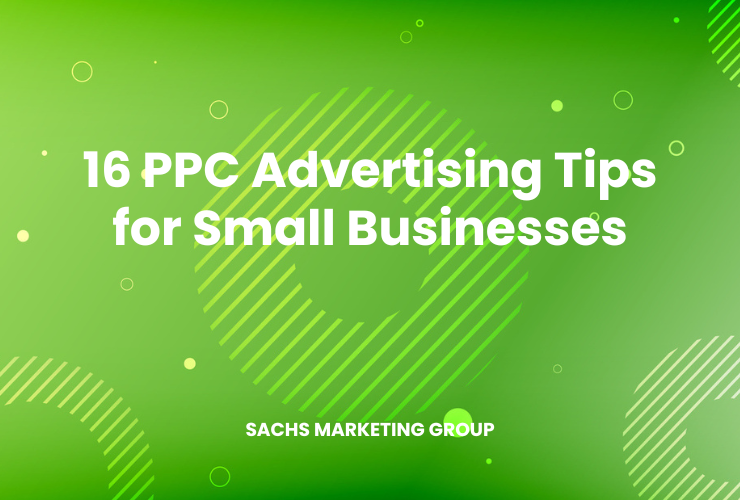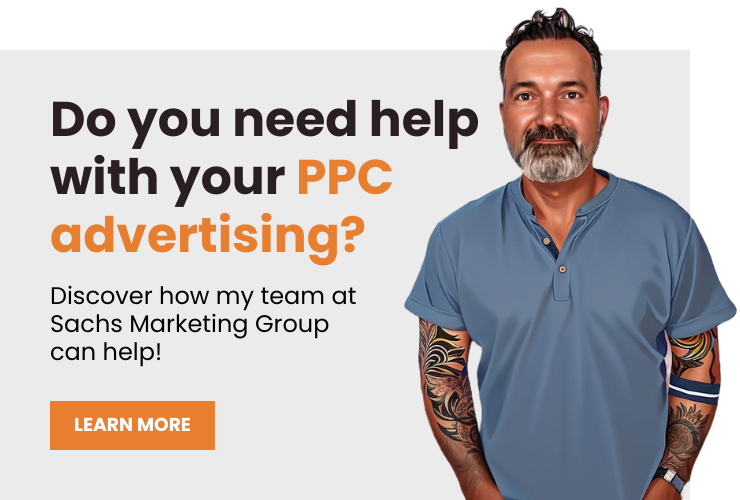Looking for some helpful PPC advertising tips for small businesses? We’ve got you covered! Running effective PPC campaigns requires a good amount of time and energy to evaluate performance and adapt, all while managing your budget so your ads produce a positive ROI. Fortunately, we have 16 PPC advertising tips to help you get started.
Are you struggling with low conversions and high costs in your PPC (pay-per-click) advertising campaigns? The frustration that comes with pouring money into ads that don’t yield returns can be overwhelming.
Imagine seeing your budget deplete rapidly without any significant improvement in sales or leads. Your competitors seem to be thriving while you’re left puzzled about what you might be doing wrong. This could lead to decreased market share and, ultimately, a threat to the sustainability of your business.
PPC Advertising for small businesses offers a targeted and cost-effective method to reach potential customers, but it requires research, optimization, and testing. To help you get started, we have some PPC advertising tips for small business owners. Whether you’re already running ads or you’re thinking about launching a campaign, this article will help you get started.
In this article, we explore what PPC advertising is, how PPC benefits small businesses, and PPC advertising tips for small businesses.
Overview
What is PPC Advertising?
PPC advertising is a model of online advertising where advertisers pay a fee each time their ad is clicked. Rather than earning visits organically, businesses can buy visits to their sites. PPC is most commonly associated with search engine advertising, where ads appear on search engine results pages.
Advertisers bid for ad placement in the sponsored links of a search engine for keywords related to their business. When a user searches for a keyword you’ve bid on, your ad has the potential to appear. If the user clicks on your ad, you pay a fee.
The Benefits of PPC for Small Businesses
PPC advertising can be especially beneficial for small businesses. First, it offers quick entry. Even if you’re way behind your competitors on jumping into PPC, you can get up and running quickly with a bit of optimization. Moreover, it’s measurable and trackable. You can see high-level performance details including impressions, clicks, and conversions.
Additionally, PPC works well with other marketing channels and provides a wealth of useful data. Small businesses can benefit greatly from this type of advertising due to its ability to drive traffic, conversions, and ultimately revenue.
PPC Advertising Tips for Small Business
Diving into the realm of PPC advertising can be overwhelming, but with the right strategies, small businesses can reap remarkable rewards. In this section, we will provide you with the top PPC advertising tips for small businesses and effective examples to help make your advertising campaigns not only efficient but also highly lucrative.
Whether you’re a newcomer or looking to refine your existing strategies, these tips will be indispensable in your advertising arsenal.
1. Start with a Simple Campaign
When beginning your PPC advertising journey, it’s best to start small. Launching a plethora of complex campaigns at once can be overwhelming, and it’s easy to lose track of what’s working and what isn’t. Focus on one campaign at first, preferably on a well-established platform like Google Ads.
As you become more comfortable with PPC advertising, you can gradually scale up. Starting small also helps you maintain a more manageable budget, which is particularly important for small businesses. It’s also simpler to track your analytics and understand them when you are only dealing with one campaign.
2. Target Specific Keywords
One of the foundations of effective PPC advertising is the proper use of keywords. Instead of using generic keywords that have a high competition, focus on more specific keywords that your potential customers are likely to use. These are often known as ‘long-tail keywords’.
For example, rather than targeting “shoes” as a keyword, target “women’s running shoes in LA”. Not only are specific keywords likely to be less competitive, but they are also usually less expensive and can attract a more targeted audience that’s more likely to convert.
3. Use Powerful Language
The language used in your ad copy can significantly affect the performance of your PPC campaign. Be bold and use strong action verbs. Make your headlines attention-grabbing and ensure that your copy resonates with the audience.
Avoid using jargon or complicated language. Keep it simple, and speak directly to the customer. A powerful message can compel users to click on your ad and take the action you desire.
For example:
- Instead of “Buy shoes here,” you might use “Unleash Your Style with Our Stunning Footwear!”
- Replace “Sign up for our newsletter” with “Unlock Insider Secrets – Join Our Exclusive Community!”
4. Use Local Keywords
If your small business serves a local market, it is essential to include local keywords in your PPC campaigns. This means using keywords that contain local names, such as the city or neighborhood where your business is located.
Examples of local keywords include the following:
- “Italian restaurant in Los Angeles”
- “Plumber near Westlake Village”
- “Best coffee shop in Santa Monica”
For example, if you have a flower shop in Brooklyn, use keywords like “flower shop in Brooklyn” or “Brooklyn flower delivery”. This helps in attracting local customers who are likely to be interested in your products or services.
5. Add Negative Keywords
Negative keywords are words that you do not want your ads to be displayed for. Adding negative keywords can help you make sure that your ads reach the most relevant audience.
For example, if you sell new cars, you can add “used” as a negative keyword so your ads don’t show up for “used cars”. This way, you are not paying for clicks that have no chance of converting.
6. Include Clear Calls to Action
Your ads should always include a clear call to action (CTA). This instructs the user on what step you want them to take next. Whether it’s “Buy Now,” “Call Today,” or “Get a Free Quote,” make sure your CTA is prominent and compelling.
Don’t overload the ad with multiple CTAs; this can confuse the audience. Stick to one clear action that you want them to take.
Examples of clear calls to action are:
- “Buy Now for 30% Off!”
- “Download Your Free E-Book Instantly!”
- “Call Today for a Free Consultation!”
7. Schedule and Pause Ads
PPC platforms allow you to schedule when your ads will run and you can also pause them anytime. Scheduling is important for targeting customers when they are most likely to be online.
For example, if you are a restaurant, you might schedule your ads to run during lunch and dinner hours. Pausing ads is useful if you have a temporary closure or if you want to take a break from the campaign without deleting it.
8. Measure Results
Tracking and analyzing the results of your PPC campaign is crucial. Keep an eye on metrics like click-through rate, conversion rate, and return on investment.
Understanding these metrics helps you to refine your campaign and make data-driven decisions. Regularly assess the performance and adjust your strategy accordingly.
9. Take Advantage of Google Analytics
Google Analytics is an invaluable tool for monitoring the performance of your PPC campaigns. It allows you to track how users interact with your website after they click on your ads. You can see which pages they visit, how long they stay, and whether they take the actions you’re aiming for, like making a purchase or signing up for a newsletter.
Additionally, Google Analytics allows you to set goals and monitor conversion rates. By integrating it with your Google Ads account, you can get a holistic view of how your campaigns are performing and where you can make improvements.
10. Look at Search Term Reports
Search term reports are a crucial component of PPC advertising. They show you the actual searches people entered on Google that triggered your ad. By analyzing these reports, you can gain insights into whether your ads are matching with the right search queries.
You might find new keyword opportunities or discover irrelevant searches for which you may want to add negative keywords. Regularly reviewing and analyzing search term reports should be an integral part of your PPC strategy.
11. Look at Your Quality Score Frequently
Your Quality Score is a metric used by Google Ads to determine the relevance and quality of your keywords and PPC ads. It plays a significant role in determining how much you pay per click.
A high-Quality Score indicates that your ads and landing pages are relevant and useful to someone looking at your ad. Regularly monitoring your Quality Score helps you understand if Google considers your ads as high quality, and you can make necessary adjustments to improve it.
12. Split Testing
Split testing, also known as A/B testing, involves creating two slightly different versions of your ads to see which one performs better. For example, you might change the headline or call to action.
For example:
- Version A: “Get Access to Exclusive Deals!” with an image of a happy family.
- Version B: “Unlock Your Special Discount Today!” with an image of a person holding shopping bags.
By comparing the performance of the two ads, you can gain insights into what resonates more with your audience. This continuous process of testing and optimization is key to improving the effectiveness of your campaigns.
13. Increase Bids for Converting Keywords
If you find certain keywords are bringing in valuable conversions, consider increasing your bids on these keywords. By allocating more budget to high-performing keywords, you can gain better ad placements and potentially drive even more conversions.
Be cautious and monitor the performance closely to ensure that the increased spend continues to provide a positive return on investment.
14. Retarget Website Visitors
Retargeting involves showing ads to people who have previously visited your website but didn’t make a purchase or take the action you wanted. This is a powerful technique as it targets people who are already familiar with your brand or product.
You can create specialized ads that speak directly to these individuals, offering them incentives or reminding them of what they left behind.
15. Monitor your Percentage of Online Search Impressions
Keeping an eye on your Impression Share (the percentage of times your ads were shown compared to the total available impressions) can help you understand if you are capturing as much of your target audience as possible. If your Impression Share is low, it might indicate that your bids are too low or your ads are not relevant enough.
16. Hire a PPC Ad Professional
Managing PPC campaigns effectively can be complex and time-consuming. If you find that you don’t have the time or expertise to manage your campaigns effectively, consider hiring a PPC ad professional or agency.
They can bring the expertise and tools necessary to optimize your campaigns. Although there is a cost involved in hiring a professional, the return on investment can be significantly higher.
FAQs
Navigating the world of PPC advertising can leave you with a plethora of questions. To simplify your journey, we’ve compiled a list of frequently asked questions that address common queries and concerns regarding PPC advertising for small businesses.
Does PPC work for small businesses?
Yes, PPC (Pay-Per-Click) advertising can be highly effective for small businesses. It allows businesses to specifically target their audience and only pay when someone clicks on the ad. This can result in a higher return on investment and the ability to compete with larger companies in online advertising.
How do I make a good PPC ad?
To create an effective PPC ad, focus on using relevant keywords and crafting a concise, attention-grabbing headline. Ensure that the ad copy resonates with your target audience and includes a clear call to action. Additionally, use ad extensions to provide additional information and value to your audience.
How much does PPC cost for small businesses?
The cost of PPC for small businesses varies based on factors such as industry, competition, and keywords. On average, small businesses spend between $9,000 and $10,000 per month on PPC. However, it’s possible to start with a smaller budget and gradually increase as you see positive results.
What is PPC marketing for small businesses?
PPC marketing for small businesses is an online advertising strategy where businesses place ads on platforms such as Google Ads and only pay when a user clicks on their ad. This strategy is used to drive traffic, increase visibility, and ultimately lead to conversions by targeting specific keywords and audiences.
What is the downside to PPC marketing?
The downside to PPC marketing is that it can be costly if not managed effectively. Without proper keyword research and budget management, costs can escalate quickly. There’s also the risk of click fraud, where competitors or bots click on your ads, causing you to pay for non-genuine clicks.
How much should I spend on PPC ads?
The amount to spend on PPC ads varies depending on your business goals, industry, and competition. It’s advisable to start with a modest budget, monitor the results closely, and gradually increase your spend based on performance. Allocating 5-10% of your monthly revenue to PPC advertising is a good starting point for many small businesses.
Partner with Sachs Marketing Group
Are you a small business owner looking to skyrocket your online presence and drive traffic to your website?
PPC advertising is a dynamic form of advertising where you only pay when someone clicks on your ad – pay-per-click. It’s incredibly targeted, and with the right strategy, you can reach customers who are actively searching for products or services like yours. Imagine your business popping up right when a potential customer is looking for what you offer!
Navigating the world of PPC can be tricky. You might be wondering how to select the right keywords, write compelling ad copy, or optimize your bids. That’s where Sachs Marketing Group comes in – our team will craft a tailor-made PPC campaign for your business, optimizing every aspect from keywords to ad copy, ensuring you get the best return on investment. Picture the exponential growth your business could achieve with expertly managed PPC campaigns.
Take control of your business’s future and make the decision that could redefine your success. Contact Sachs Marketing Group and let the experts take your PPC advertising management to the next level. Your future customers are just a click away.
Conclusion
PPC advertising can be a highly effective marketing tool for small businesses. By starting with a simple campaign, targeting specific keywords, using powerful language, and monitoring results, small businesses can maximize their PPC efforts.
Once you’ve launched your PPC campaign, discover how to improve PPC ROI and get the most bang for your buck.
Partnering with a specialist like Sachs Marketing Group can further enhance your PPC campaigns and help achieve your business goals. Whether you’re new to PPC or looking to improve your existing campaigns, these advertising tips for small business will set you on the path to success.



